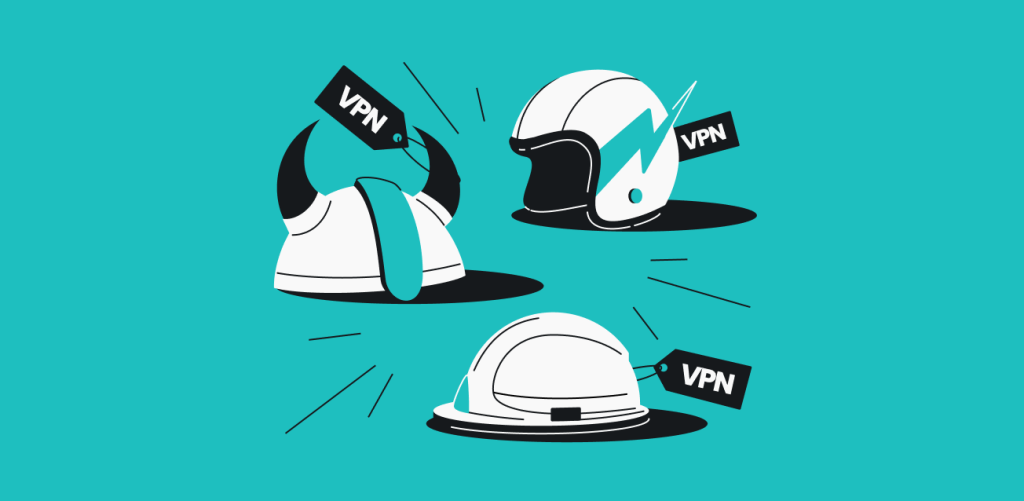
As a humble user, you may not be immediately smitten by our VPN’s (Virtual Private Network) whimsical name and the allure of the software-defined network. That’s ok! And since we believe everyone should know what else is out there before deciding what’s best for them, today we’re going to share 14 Surfshark alternatives with you.
Table of contents
-
NordVPN
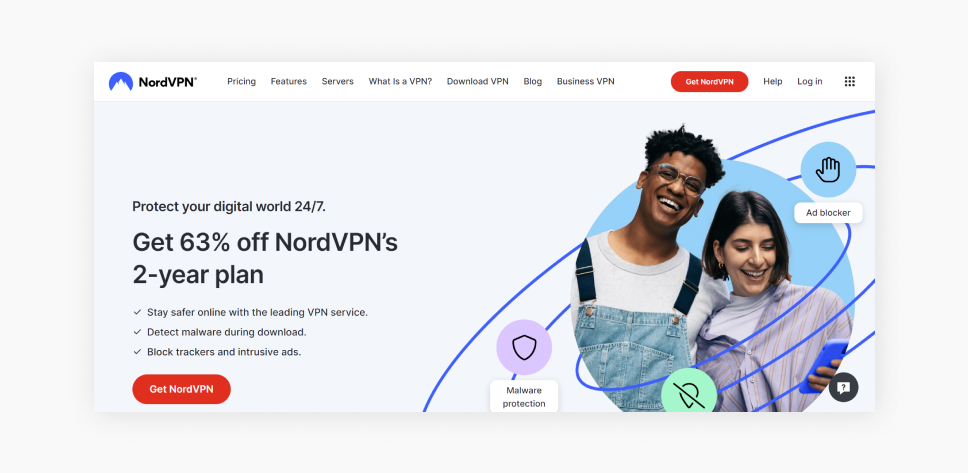
NordVPN — of no relation to the residents of the imperial province of Skyrim — has been among the leading VPN providers for some time now. At the time of writing, they offer 5705 servers in 60 countries.
Outside regular servers, NordVPN also offers Double VPN (connecting via two servers), Onion Over VPN (routing via Tor network and VPN), static IP, obfuscated servers, and more. Said servers are configured to run NordLynx (a variant of WireGuard), IKEv2, and/or OpenVPN protocols, which are all good.
A single NordVPN account offers protection for up to six devices simultaneously.
Read the full Surfshark vs. NordVPN breakdown.
-
Private Internet Access (PIA)
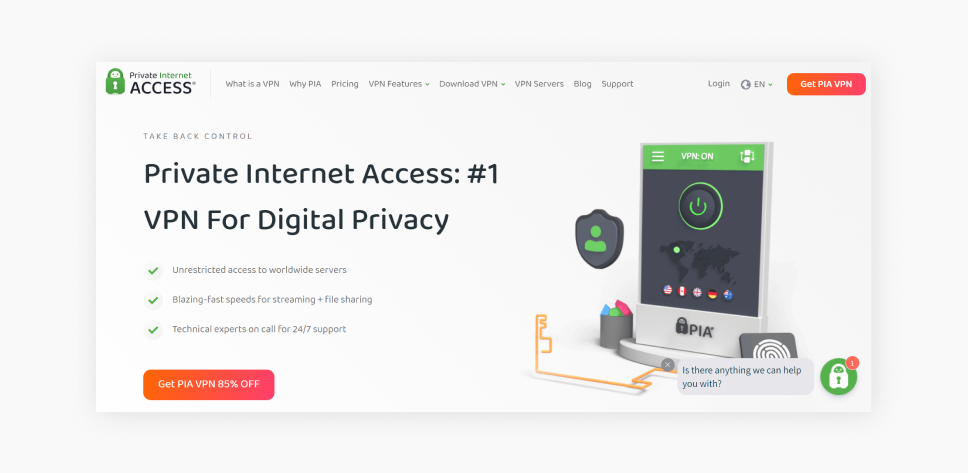
Private Internet Access — abbreviated to PIA — is another respectable Surfshark alternative. One big advantage of PIA is that it’s an open-source VPN. This means that tech nerds and security gurus can go rooting through its code to check if the VPN app is actually secure and privacy-respecting.
PIA doesn’t state how many servers it has. However, they offer great coverage in the US, with server locations in all 50 states. It has also received positive reviews from major publications. At the same time, the management was criticized that the VPN hadn’t undergone an audit — and they took that criticism seriously. In 2022, PIA was audited by Deloitte (just like Surfshark).
Read the full Surfshark vs. PIA breakdown.
-
CyberGhost VPN
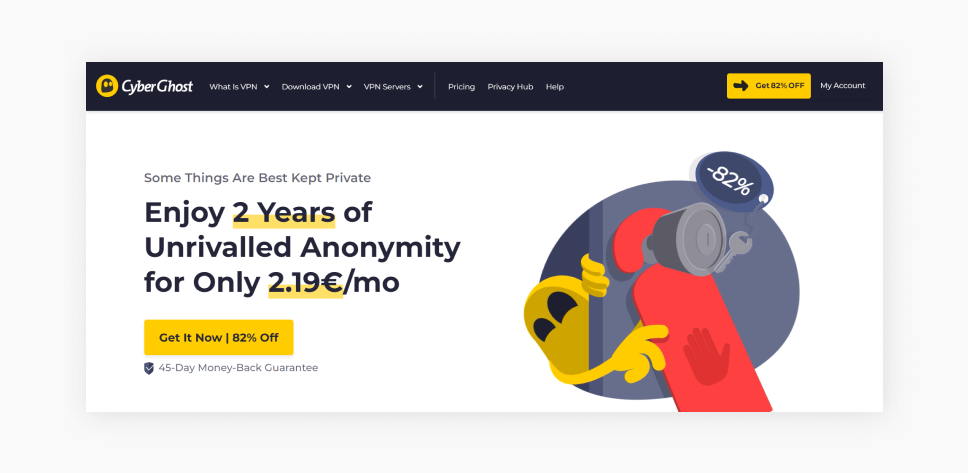
CyberGhost VPN offers great value out of the gate by having 9078 servers in 91 countries! That’s a whole lot of servers. What’s more, they are RAM-only (just like Surfshark’s servers). This means that if the servers were to be seized and disconnected from the power supply, they would wipe all the data going through them.
CyberGhost, just like any other company worthy of a position on this list, has had its no-logs policy audited by Deloitte, a world-class auditing agency.
Another notable feature is the 45-day money-back guarantee, which is longer than the industry-standard 30 days.
Read the full Surfshark vs. CyberGhost breakdown.
-
ProtonVPN
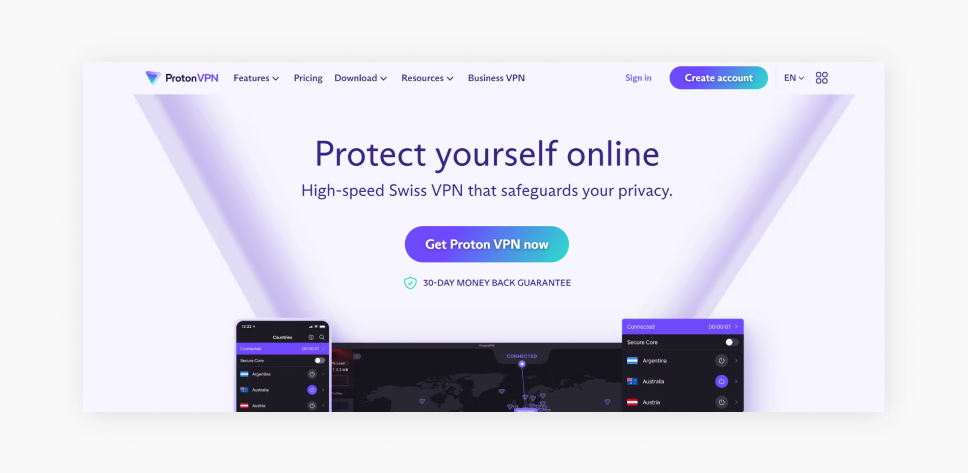
ProtonVPN is a free VPN and is very upfront about the free service being paid for by premium users. As a free user, you are encouraged to subscribe to get better service.
Offering 2,963 servers in 67 countries, ProtonVPN has a respectable roster. All servers are supposedly hooked up on 10Gbps ports and use their Accelerator technology to make VPN usage even faster.
ProtonVPN is based in Switzerland, a country with robust privacy laws. It was founded by a specialist from CERN and is supported by the European Commission and FONGIT, a Swiss-government-funded non-profit promoting tech development that benefits all.
Read the full Surfshark vs. ProtonVPN breakdown.
-
ExpressVPN
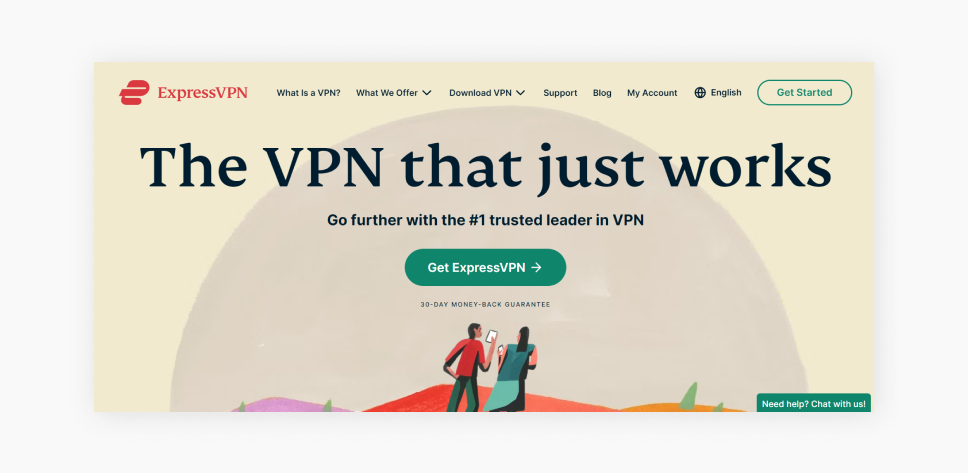
ExpressVPN, another giant of the VPN market, started in 2009 and is now owned by Kape Technologies, the same company that had purchased the previously mentioned PIA VPN and CyberGhost.
Back to ExpressVPN, it has servers in 94 countries and uses LightWay — its own VPN protocol. LightWay is similar to the critic-darling WireGuard, but uses some different approaches. It also supports OpenVPN and IKEv2, just like any other decent VPN.
ExpressVPN is also serious about the no-logs policy and has completed three audits to prove it. One of them comes from Cure53, a group Surfshark had tagged to audit our own systems.
Oh, and ExpressVPN protection extends to five devices at a time (while Surfshark offers unlimited connections).
Read the full Surfshark vs. ExpressVPN breakdown.
-
Windscribe
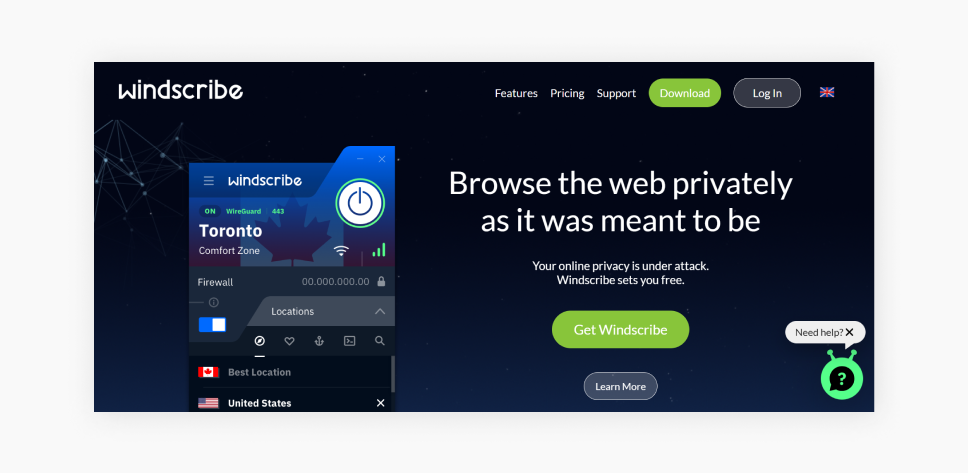
Windscribe openly declares their freemium model (you can pay to get access to all 100+ server locations) and the fact that they won’t promote themselves via paid VPN reviews or social media influencers who aren’t cybersecurity experts.
Windscribe’s transparency extends to the status of their servers — Windscribe has a page that shows live data about their total network use as well as the congestion of any single server location. There’s also a page displaying the number of DMCA and law enforcement data requests, none of which were allegedly complied with.
Windscribe suffered a server seizure in Ukraine in 2021 but has been doing nicely since, with trusted IT websites declaring it the free VPN of the year.
-
Mullvad
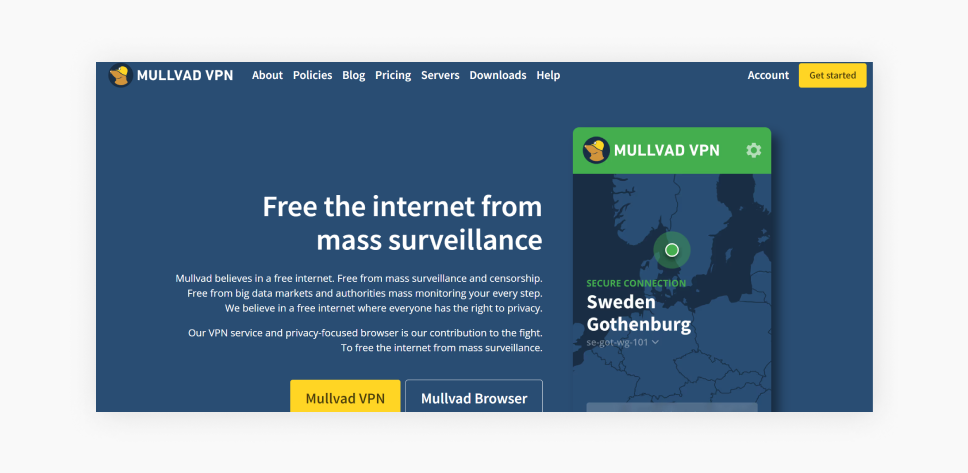
Mullvad has been listed among the five best VPNs for privacy by the Freedom of the Press Foundation (Surfshark also appears on that list).
At the moment of writing, Mullvad has 644 online and 15 offline servers. To demonstrate its cred among IT nerds, you can see not only the server’s status but also the location, the provider, whether it’s rented or not, and its IP addresses.
Mullvad also has its own browser created together with the Tor project team. Yet, it uses VPN and not the Tor network. Mullvad is also the one supplying servers for the Mozilla VPN.
Read the full Surfshark vs. Mullvad comparison.
-
PrivateVPN
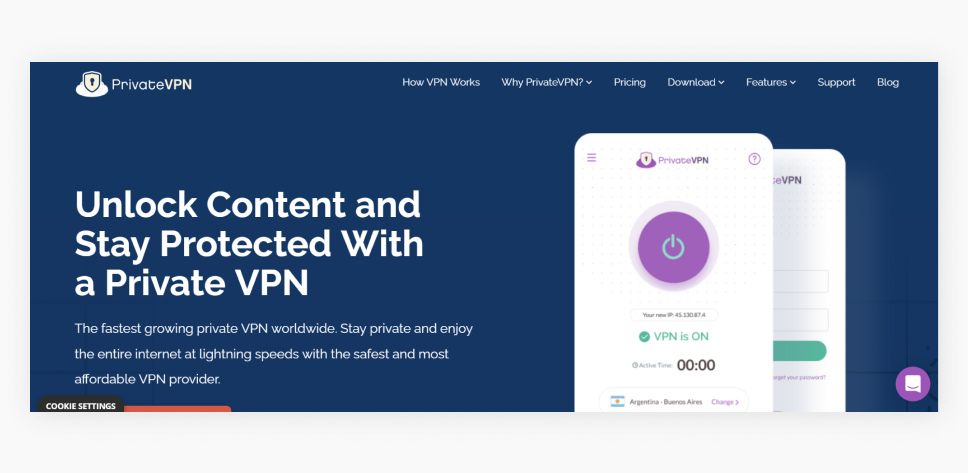
PrivateVPN hosts 200+ server locations in 63 countries, though they don’t provide the number of actual servers. Their killer feature is supposed to be their modus operandi of buying high-speed bandwidth directly from IP traffic providers rather than hosting companies, which cuts out the middleman and decreases the costs.
Aside from that, PrivateVPN claims that their customer support is the best in the market, including remote desktop sessions carried out via TeamViewer.
-
IPVanish
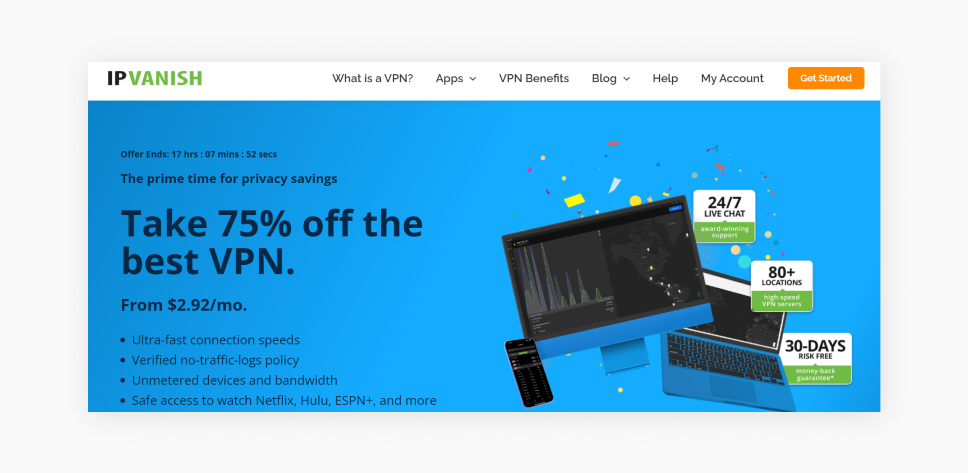
IPVanish boasts 2000+ servers in 75+ countries — a respectable amount no matter which way you cut it. It supports the usual workman VPN protocols — WireGuard, IKEv2, IPSec, and OpenVPN.
IPVanish is based in the US, claiming that this serves to better protect the interests of its users. It has also undergone an independent audit by the Leviathan Security Group.
Read the full Surfshark vs. IPVanish review.
-
Urban VPN
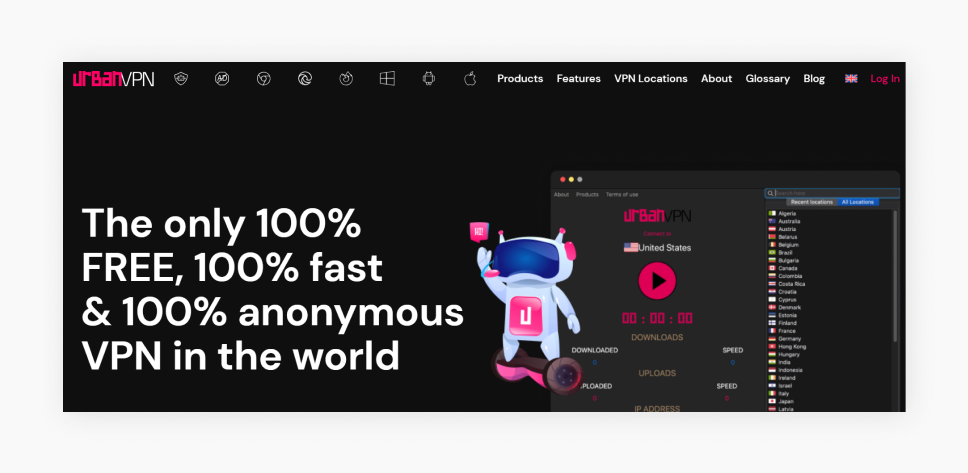
Urban VPN bills itself as “the only 100% FREE, 100% fast & 100% anonymous VPN in the world.” It comes with 80+ server locations, including the US, most European nations, and major Asian countries.
It works on the principle of a peer-to-peer VPN. That is, users of the VPN network allow others to use their network resources for free. But with all this talk without mentioning money, how does Urban VPN keep its lights on? Well, as they state on their “Do not sell” page, Urban VPN is “selling your data anonymously to 3rd parties” — though users can opt out of it.
-
Hotspot Shield
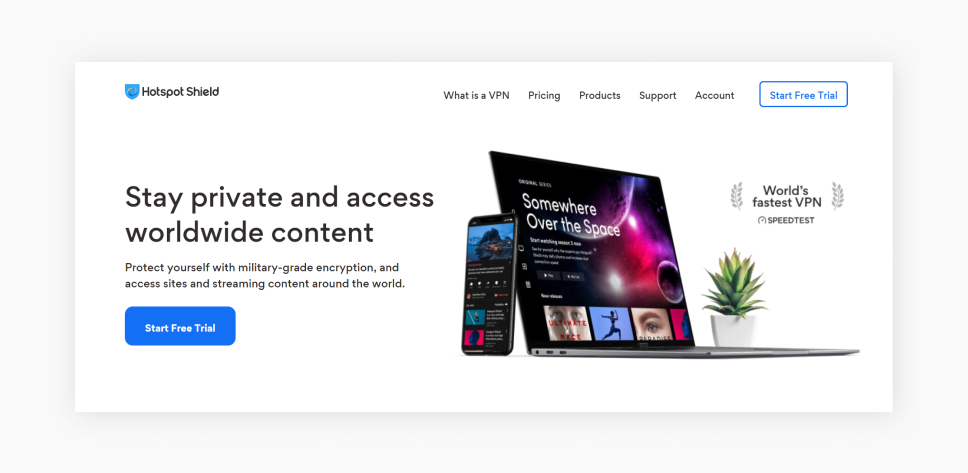
Hotspot Shield’s title outright spells out its attractiveness to consumers: protecting yourself when you connect to a Wi-Fi hotspot. Of course, that’s only one of the benefits any VPN provides. So, to sweeten the deal, Hotspot Shield also offers a pared-down free version.
But if you spring for the entire thing, you get full access to all the features, server locations, and more. In fact, the Premium family plan allows for five user accounts with five supported devices per account. And all of them can connect to one of the 1800+ servers in 80+ countries.
-
PureVPN
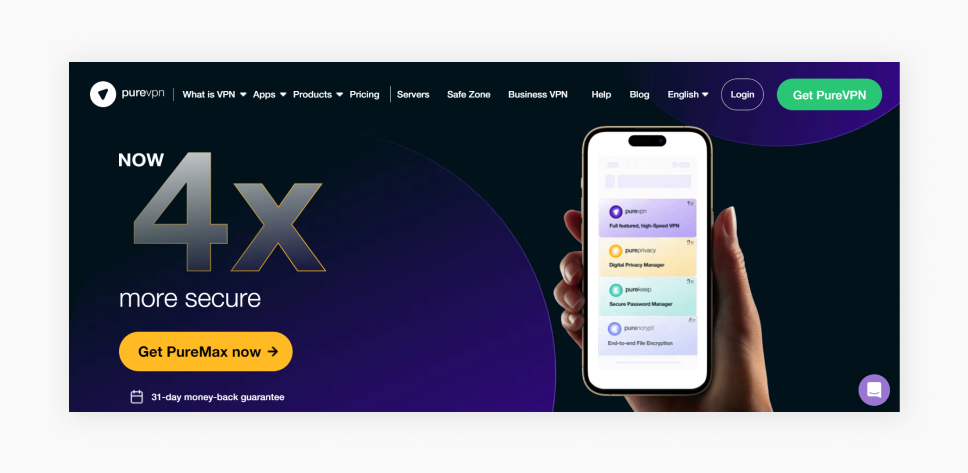
PureVPN is another name in the VPN market that only needs some introduction. Its current stand-out feature is quantum-resistant encryption keys. This means their encryption is future-proofed for when quantum computing becomes more common.
PureVPN has 6,500+ VPN servers in 88+ locations in 70+ countries. However, some of them are virtual, and you can supposedly check which ones are in the website’s server list. Like many other VPN providers, PureVPN offers additional services like password vaults. They also have solutions for enterprise clients, which is something you don’t see often.
-
PrivadoVPN
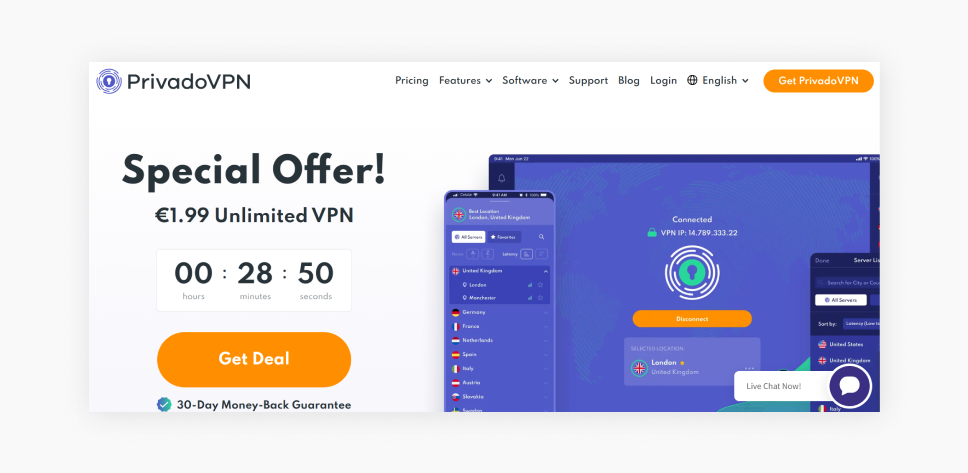
PrivadoVPN comes from Switzerland and uses this as a marketing point: your data is protected by Swiss law! This means you’re protected from the local government getting handsy with your data. And you’re also afforded additional privacy thanks to the zero-logs policy.
PrivadoVPN doesn’t list the exact number of servers, but they can be found in 48 countries and 64 cities worldwide. They are supplemented by the SOCK5 proxy used not via the VPN app but your file transfer client. You may sign up for the VPN for free, though it’s capped at 12 locations and 10 gigabytes per month.
-
Hide.me VPN

Hide.me VPN is based in Malaysia. It claims this is an excellent benefit since Malaysia supposedly has no law demanding logs to be kept. What’s more, they say that they can’t even keep any logs as their technology is configured only to record anonymous usage logs that aren’t tied to any real user IP.
Hide.me has one of the most permissive free options in the market. You don’t even need to sign up to use it! However, Hide.me is a lot more cagey about its server counts: it only reveals having 79 server locations in 6 continents.
Why choose Surfshark over the alternatives?
Premium VPN providers are constantly working to innovate, exceed customer expectations, and, well — be better than the competition. Knowing how they compare will help you choose the right VPN for you. Why go with Surfshark over the alternatives? Good question! Here’s why:
- 4,500+ servers in 100+ countries: that’s literally more servers than you can shake a stick at, ensuring that you’re likely to have one right next to your location and lowering the chances of server congestion (all for greater speeds);
- Software-defined network: this tells a lot to the tech people, but for the regular user, software-defined network means that our VPN servers are connected to an actual network which allows for capabilities like custom multihop VPN;
- Cutting-edge encryption: Surfshark uses mainly WireGuard with the option to switch to OpenVPN and (on select platforms) IKEv2;
- Speedy ports: all servers have at least a 1Gbps port, and the roster is continuously upgraded to the 10Gbps standard;
- Cool features: Kill Switch, static IP servers, Dynamic MultiHop — that’s not an exhaustive list of snazzy VPN tools you gain merely by subscribing to Surfshark;
- Dedicated IP: an anonymized address that’s only assigned to you personally, which means fewer captchas and stable access to services sensitive to IP changes;
- Audit-approved no-logs VPN policy: we wouldn’t harp so much about audits if we weren’t fans of them;
- Trusted online: Surfshark reviews come from trusted media sources and individual users — and they rate us highly;
- Headquartered in the Netherlands: it’s an EU country with great user privacy protections.
The best part of it all? All the features are yours to test out with Surfshark’s VPN free trial.
FAQ
What are the disadvantages of Surfshark alternatives?
- May not offer as many servers;
- May not offer servers with 10 Gbps connections;
- May lack additional services like obfuscation or static IP;
- May not have audits proving their security and dedication to privacy;
- May be headquartered in countries that don’t respect the privacy of internet users;
- May be free but suffer from every weakness listed above;
- May not have “shark” in the title.
Which VPN is the cheapest?
It depends on the moment-to-moment deals, but Surfshark is $2.49/month with the 24-month option, which is fairly cheap! However, Mullvad’s fixed $5/month rate means it’s the cheapest if you want a VPN for a single month-only.
Which Surfshark alternative is the best?
The best Surfshark alternative depends on the user’s particular needs.
Do Surfshark alternatives support unlimited devices?
IPVanish, and, technically, Windscribe, are among the Surfshark alternatives that support unlimited devices. Windscribe describes some caveats on their website, so read up on them. Others, to the best of our knowledge, currently don’t offer this.


